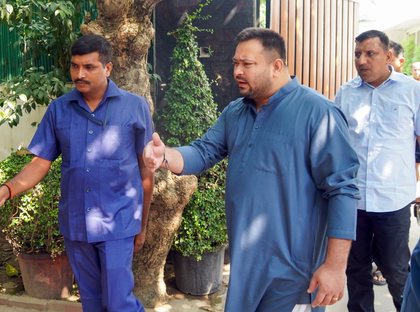‘Poll play or truth’: Tejashwi cries foul over case timing
By IANS | Updated: October 13, 2025 19:20 IST2025-10-13T19:19:51+5:302025-10-13T19:20:09+5:30
New Delhi, Oct 13 Rashtriya Janata Dal (RJD) de facto chief Tejashwi Yadav‘s reaction on Monday came on ...

‘Poll play or truth’: Tejashwi cries foul over case timing
New Delhi, Oct 13 Rashtriya Janata Dal (RJD) de facto chief Tejashwi Yadav‘s reaction on Monday came on expected lines when a Delhi court framed charges against him, his father Lalu Prasad Yadav, and mother Rabri Devi in the Indian Railway Catering and Tourism Corporation (IRCTC) hotel land-for-job case.
He cried foul, claiming the case to be politically motivated, and attempted to distract people from the Bihar government's alleged shortcomings.
The case pertains to allegations that, as Railway Minister between 2004 and 2009 in the United Progressive Alliance government, Lalu and his family received prime land in exchange for awarding maintenance contracts for two IRCTC hotels to a private company in violation of norms.
Through the current buildup to the November Assembly election, Tejashwi Yadav dismisses the 'Jungle Raj' allegations against his father-led government in the 1990s, targeting incumbent Chief Minister Nitish Kumar on issues of corruption, deteriorating law and order, and a lack of a blueprint for development.
Resorting to an emotional line, he said that he would continue to fight against the ruling alliance as long as he is alive. In an attempt at galvanising local sentiments, he hit out at the Bharatiya Janata Party (BJP) and its leaders, and identifying himself as a "true Bihari", exerted he does not fear “Bahari”, or outsiders.
Incidentally, Lalu Prasad Yadav has been the subject of multiple criminal and corruption cases over many years. Some of those matters led to convictions and sentences, while others were investigated, stayed, appealed, or are still pending in various courts. His spells in jails, added to the advancing years and ailments, led to his absence from active participation in politics and poll campaigns.
Meanwhile, Nitish Kumar’s reign – though marking a complex political journey with shifting alliances – has earned public appreciation for governance.
In 2005, when his major tenure began, he launched the “Sushasan” (good governance) campaign and focused on infrastructure, like roads, electricity, and school enrollment improvement.
Between 2010-2014, his government laid emphasis on law and order and introduced certain police reforms. Though he returned to power in 2015 with the support of the RJD-led Mahagathbandhan, he broke out of it and went back to ally with the BJP-led National Democratic Alliance (NDA).
Despite winning the 2020 polls, Nitish turned back to lead another government in alliance with the RJD and its allies in 2022, but again returned to the NDA fold. Tejashwi, who was appointed Deputy Chief Minister once between 2015–2017, and then 2022-2024, both in Nitish Kumar-led government, could never forget, nor forgive, the consecutive breakups.
The RJD leader has frequently criticised Nitish Kumar’s shifts, alternating with alleged misgovernance. Now he is expected to try and play the martyr, claiming that he is being framed so that if convicted, he can be kept out of the poll process.
Incidentally, in 2013, when Lalu was sentenced to jail for five years, he lost his Lok Sabha seat and was also barred from contesting elections for the period of his conviction and for six years after release.
As per Section 8(1) of the Representation of the People Act, 1951, a person can be disqualified from contesting elections if convicted of certain offences, particularly if sentenced to imprisonment for not less than six months.
It provides that a person convicted of an offence punishable under specific laws and sentenced to imprisonment for not less than six months shall be disqualified from contesting elections. This disqualification is effective from the date of conviction and continues for a period of six years after their release.
In the latest IRCTC case, where charges have been framed, the next steps will be trial proceedings. For earlier cases, outcomes depend on the status of appeals, bail conditions, and any active prosecutorial or appellate actions.
For Tejashwi, therefore, these are times of unease for the head that wants to wear the crown. But how far he will be able to paint a picture of political framing will be known once the canvas is ready after the poll results are announced.
Disclaimer: This post has been auto-published from an agency feed without any modifications to the text and has not been reviewed by an editor
Open in app